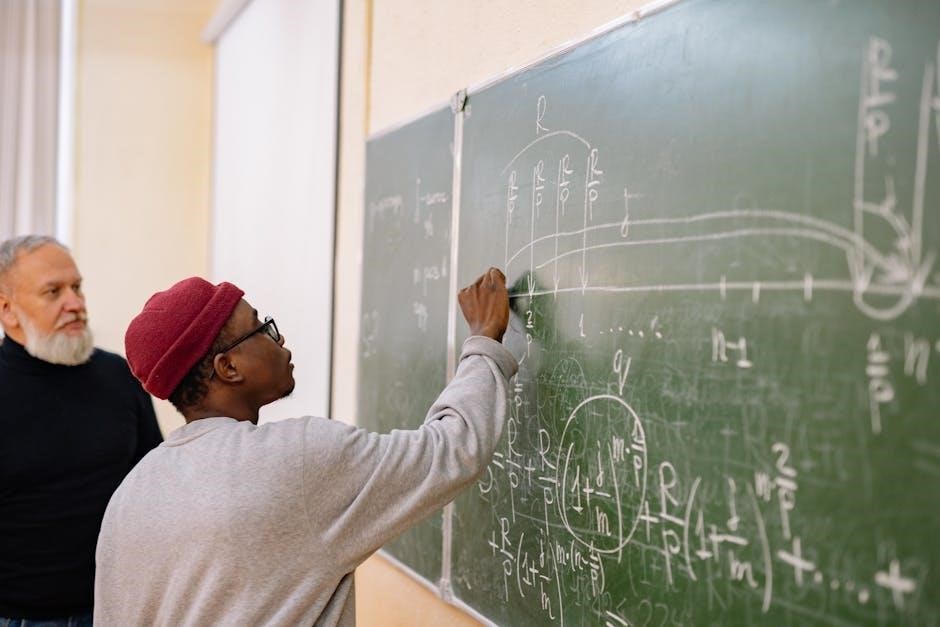Olympics quizzes are engaging tools for testing knowledge on Olympic history‚ sports‚ and athletes․ Available as downloadable PDFs‚ they offer a variety of questions suitable for all levels‚ enhancing learning through interactive challenges․
1․1 Types of Quizzes
Olympics quizzes come in various formats‚ catering to different audiences and purposes․ Multiple-choice questions are popular for their simplicity‚ while true or false and fill-in-the-blank options test specific knowledge․ Trivia quizzes often feature a mix of easy and challenging questions‚ making them ideal for both casual learners and enthusiasts․ Some quizzes focus on hosting cities and medal counts‚ while others delve into historical facts or notable athletes․ PDF resources frequently include answer sheets‚ making them versatile for events or self-study․ These diverse formats ensure there’s something for everyone‚ whether for fun‚ education‚ or competitive events․
1․2 Benefits for Learners
Olympics quizzes offer numerous benefits for learners‚ fostering engagement and knowledge retention․ They provide an interactive way to explore Olympic history‚ sports‚ and notable athletes․ Quizzes enhance critical thinking and trivia skills‚ making learning fun and competitive․ For students‚ they serve as valuable study aids‚ preparing for exams or expanding general knowledge․ The structured format of questions and answers in PDFs allows learners to track progress and identify areas for improvement․ Additionally‚ quizzes promote teamwork when completed in groups‚ encouraging collaboration and healthy competition․ They are also accessible for self-study‚ enabling learners to test their understanding at their own pace․ Overall‚ Olympics quizzes are versatile tools that cater to diverse learning needs and preferences․

Popular Olympics Quiz Questions
Olympics quizzes feature engaging questions on history‚ sports‚ and notable athletes‚ offering a fun way to test knowledge․ Available in downloadable PDFs‚ they cater to learners of all levels․
2․1 Easy Level Questions
Easy-level Olympics quiz questions are perfect for beginners‚ covering basic facts like the origin of the Games‚ famous athletes‚ and iconic events․ PDFs offer simple multiple-choice or true/false formats‚ making them accessible for everyone․ These questions help build foundational knowledge and spark interest in the Olympics․ They are ideal for educational activities or casual trivia nights‚ ensuring everyone can participate and enjoy learning about the world’s premier sporting event․
2․2 Medium Level Questions
Medium-level Olympics quiz questions are designed to challenge participants with more detailed knowledge․ These questions cover specific events‚ notable athletes‚ and historical milestones‚ requiring a deeper understanding of the Olympics․ PDF resources often include queries about medal counts‚ famous female participants‚ and lesser-known historical facts․ They are ideal for expanding knowledge beyond the basics and engaging those with some prior familiarity․ These questions are perfect for educational purposes or competitive trivia nights‚ offering a balance between accessibility and complexity․ They cater to a wide audience‚ making them versatile for various group activities and fostering a deeper appreciation for the Olympics’ rich history and global impact․

Best PDF Resources for Quizzes
Premium and free downloadable PDFs offer comprehensive collections of Olympics quiz questions and answers․ These resources are ideal for exams‚ trivia nights‚ or casual learning‚ providing detailed insights into Olympic history‚ sports‚ and notable athletes․
3․1 Free Downloadable PDFs
Free downloadable PDFs provide an excellent way to access Olympic quiz questions and answers․ These resources are readily available online‚ offering a wide range of questions covering Olympic history‚ sports‚ athletes‚ and medal counts․ Many websites‚ such as GKToday and PubQuizQuestionsHQ‚ offer comprehensive collections suitable for exams‚ trivia nights‚ or educational purposes․ These PDFs often include multiple-choice questions‚ true/false formats‚ and fill-in-the-blank exercises‚ catering to different learning styles․ They are ideal for teachers‚ students‚ and quiz enthusiasts looking to test their knowledge or prepare for events․ The PDFs are typically well-organized‚ easy to print‚ and free of charge‚ making them accessible to everyone․ They are a great tool for engaging with Olympic facts and trivia in a fun and educational way․
3․2 Premium Resources Available
Premium resources offer enhanced features for those seeking in-depth Olympic quiz content․ These paid options provide additional benefits‚ such as customizable question sets‚ detailed answer explanations‚ and exclusive content․ Websites like UPSC Mains and specialized quiz platforms offer premium PDFs tailored for competitive exams or advanced learning․ These resources often include high-quality visuals‚ historical data‚ and expert insights‚ making them valuable for serious learners and professionals․ While free PDFs are sufficient for casual use‚ premium resources cater to those needing comprehensive and structured study materials․ They ensure a more immersive and effective learning experience‚ ideal for individuals aiming to master Olympic trivia or prepare for high-level competitions․

Historical Facts in Olympics
The Olympics originated in ancient Greece‚ with the first recorded games in 776 BC․ Revived in 1896 by Pierre de Coubertin‚ they have since become a global event‚ blending tradition with modern sports․
4․1 Ancient Olympics History
The ancient Olympic Games began in Olympia‚ Greece‚ around 776 BC‚ held every four years for over 1‚000 years․ Events included running‚ wrestling‚ and chariot racing‚ with the Olympic Truce ensuring peace during the games․ They were banned in 393 AD by Emperor Theodosius but resumed in 1896․ These historical facts offer insights into the origins of the world’s premier sporting event‚ highlighting its enduring legacy․
4․2 Modern Olympics Milestones
The modern Olympic Games were revived in 1896 under Pierre de Coubertin’s leadership‚ with the first games held in Athens‚ Greece․ Key milestones include the introduction of the Winter Olympics in 1924‚ the debut of the Paralympic Games in 1960‚ and the inclusion of women’s events starting in 1900․ Over time‚ the Olympics have grown to include more sports and countries‚ promoting unity and competition worldwide․ Recent innovations‚ such as the addition of new sports like surfing and skateboarding‚ continue to evolve the Games‚ ensuring their relevance in the modern era․ These milestones highlight the transformation and progress of the Olympic movement since its revival․

Notable Olympians
Michael Phelps‚ Simone Biles‚ and Usain Bolt are among the most decorated Olympians‚ with Phelps holding the record for the most gold medals won by an individual․
5․1 Most Decorated Athletes

Michael Phelps stands as the most decorated Olympian‚ securing an unprecedented 28 medals‚ including 23 golds‚ across four Olympic Games․ His dominance in swimming has set a benchmark for future athletes․ Larisa Latynina‚ a Soviet gymnast‚ holds 18 medals‚ making her one of the most decorated female Olympians․ Her versatility across multiple events showcased her exceptional talent․ Paavo Nurmi‚ the “Flying Finn‚” won 12 medals in distance running‚ dominating the 1920s․ These athletes exemplify dedication‚ skill‚ and perseverance‚ inspiring generations․ Their achievements are celebrated in Olympics quizzes‚ highlighting their contributions to the Games’ legacy․
5․2 Famous Female Participants
The Olympics have witnessed remarkable performances by female athletes‚ inspiring millions worldwide․ Simone Biles‚ a gymnastics legend‚ became the most decorated gymnast in World Championship history‚ showcasing unparalleled skill and determination․ Serena Williams‚ a tennis icon‚ has triumphed in multiple Olympic events‚ advocating for women’s empowerment in sports․ Katie Ledecky‚ a swimming sensation‚ has shattered records‚ earning numerous gold medals and cementing her legacy as one of the greatest swimmers․ These women‚ along with others like Nadia Comăneci and Steffi Graf‚ have redefined excellence in their respective sports․ Their achievements are celebrated in Olympics quizzes‚ highlighting their pivotal role in shaping the Games’ history and motivating future generations of female athletes․

Hosting Cities and Medal Counts
The Olympics have been hosted by cities like Beijing‚ London‚ and Paris‚ each leaving a unique legacy․ Medal counts highlight the dominance of the USA and USSR historically․
6․1 Past Host Cities
The Olympic Games have been hosted by numerous cities worldwide‚ each leaving a unique mark on the event’s history․ Notable past hosts include Athens (1896 and 2004)‚ Beijing (2008)‚ London (1908 and 2012)‚ Paris (1900 and 1924)‚ Tokyo (1964 and 2020)‚ and Los Angeles (1932 and 1984)․ These cities have showcased their cultural and infrastructural capabilities‚ setting the stage for memorable performances․ Rio de Janeiro (2016) and Seoul (1988) are also among the prominent hosts‚ highlighting the global reach of the Olympics․ Each host city brings its own flavor‚ contributing to the rich legacy of the Games․
6․2 Countries with Most Medals
The United States leads the medal count in the Olympics‚ with a total of over 1‚000 gold medals and more than 2‚500 overall․ The Soviet Union historically ranked second‚ but since its dissolution‚ Russia has continued to perform strongly․ Great Britain‚ France‚ and China also consistently rank among the top medal-winning nations․ These countries’ success is often attributed to their robust athletic programs‚ investment in sports infrastructure‚ and strong participation across various disciplines․ The medal tally often reflects a nation’s sporting prowess and cultural emphasis on the Olympics․ These rankings are frequently updated and remain a key point of interest in Olympic quizzes and discussions․
